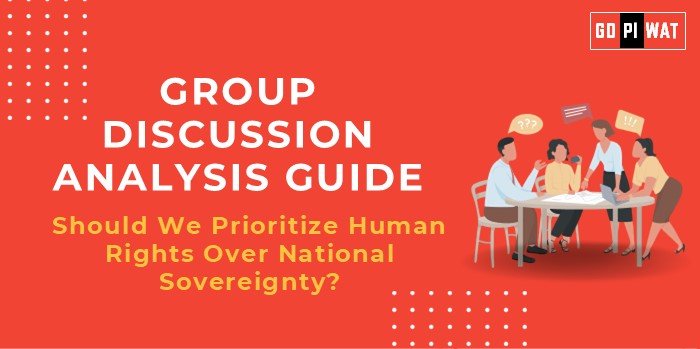📋 Group Discussion (GD) Analysis Guide: Should We Prioritize Human Rights Over National Sovereignty?
🌐 Introduction to the Topic
- 🔍 Opening Context: The balance between human rights and national sovereignty is a pressing global debate, with implications for international relations, humanitarian interventions, and governance.
- 📖 Topic Background: The principle of national sovereignty stems from the Treaty of Westphalia (1648), emphasizing non-interference. However, global events such as interventions in Libya and debates over China’s treatment of Uyghurs question if sovereignty should remain inviolable when human rights are at stake.
📊 Quick Facts and Key Statistics
– 🌍 UN Human Rights Violations (2023): Over 80 countries reported significant rights violations, showcasing the global scale of the issue.
– 🚨 Interventions Post-2000: 12+ humanitarian interventions globally, emphasizing the contested space between rights and sovereignty.
– 🌐 Refugee Numbers: 35 million people displaced due to human rights abuses (UNHCR, 2024).
– ⚖️ Global Sovereignty Index: 62% of nations prioritize sovereignty in legal frameworks over rights enforcement (2023).
– 🚨 Interventions Post-2000: 12+ humanitarian interventions globally, emphasizing the contested space between rights and sovereignty.
– 🌐 Refugee Numbers: 35 million people displaced due to human rights abuses (UNHCR, 2024).
– ⚖️ Global Sovereignty Index: 62% of nations prioritize sovereignty in legal frameworks over rights enforcement (2023).
🤝 Stakeholders and Their Roles
- ⚖️ Governments: Balancing national security and global norms.
- 🌍 International Bodies (UN, ICC): Enforcing human rights standards.
- 📢 NGOs and Activists: Advocating for victims and holding governments accountable.
- 👥 Citizens: Bearing the impact of sovereignty-centric or rights-centric policies.
🏆 Achievements and Challenges
✨ Achievements:
- 🌐 Global Human Rights Treaties: Over 170 nations committed to the Universal Declaration of Human Rights (UDHR).
- 🤝 Humanitarian Interventions: Examples like NATO’s role in Kosovo have prevented genocide.
- 📢 Global Awareness: Movements like #MeToo and #BlackLivesMatter have catalyzed rights advocacy worldwide.
⚠️ Challenges:
- ⚖️ Sovereignty Misuse: Nations use sovereignty to shield human rights abuses (e.g., Myanmar’s Rohingya crisis).
- 📜 Selective Interventions: Inconsistency in global response based on political interests (e.g., Iraq vs. Syria).
- 💸 Resource Constraints: Lack of funding for global bodies like the ICC limits enforcement capabilities.
🌍 Global Comparisons:
– Success: Rwanda’s post-genocide human rights recovery through international collaboration.
– Challenges: China’s human rights policies highlight sovereignty prioritization over international norms.
📌 Case Studies:
– India: Balancing rights with sovereignty in managing Jammu & Kashmir.
– Germany: Open-door refugee policy, emphasizing rights over sovereignty.
🧠 Structured Arguments for Discussion
- ✅ Supporting Stance: “Prioritizing human rights establishes global moral authority and prevents humanitarian disasters.”
- ❌ Opposing Stance: “Sovereignty safeguards national integrity and prevents external manipulation.”
- ⚖️ Balanced Perspective: “Both are critical; sovereignty must not shield abuses, but unchecked intervention risks destabilization.”
🎯 Effective Discussion Approaches
- 📜 Opening Approaches:
- 📖 Historical Context: “The Treaty of Westphalia set the foundation for sovereignty, but evolving norms question its absoluteness.”
- 📈 Statistical Impact: “With 35 million displaced globally, human rights violations demand global priority.”
- 🔍 Counter-Argument Handling:
- Example: “Acknowledging sovereignty’s importance, the international community must act only when evidence of rights abuse is clear.”
🔍 Strategic Analysis of Strengths and Weaknesses
- 💪 Strengths: Global frameworks like UDHR; public support for human rights.
- ⚠️ Weaknesses: Politicization of interventions; inconsistent enforcement.
- 🚀 Opportunities: Technological tools for accountability; stronger global coalitions.
- ⚡ Threats: Rising nationalism; geopolitical divides undermining consensus.
🎓 Connecting with B-School Applications
- 🌟 Real-World Applications: Themes of ethical decision-making and global governance in management roles.
- ❓ Sample Interview Questions:
- “Can sovereignty and human rights coexist harmoniously?”
- “How can businesses uphold human rights in authoritarian regimes?”
- 💡 Insights for B-School Students: Ethical dilemmas in leadership, policy analysis, and global collaboration frameworks.


